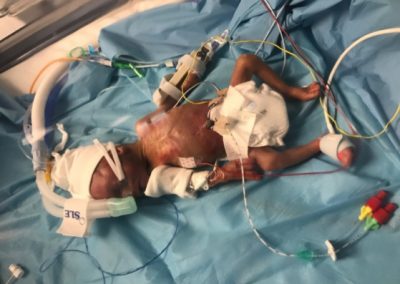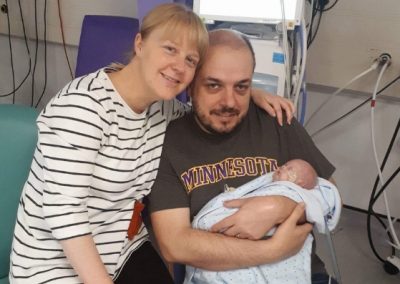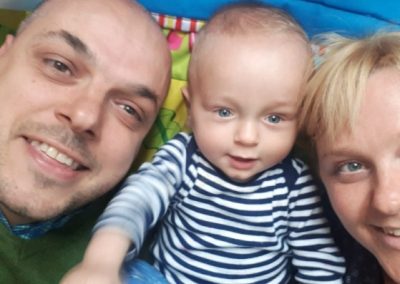Ray’s story

“My son Otis was born 14 weeks premature so I didn’t even make a start on the parenting books I’d been given by friends. Like any expectant birth though I’d daydreamed of the day my first child would be born and it went along the lines of turning up at the hospital, a few tough hours for Ad my wife, Otis joining us at the end of it and then going home on cloud nine the next day. That isn’t how it happened for us.
“At 26 weeks pregnant, Ad started feeling unwell so we went to the hospital just to get checked over. While we were waiting to be seen Ad asked me to time the gaps between the pain she was having. I think we were both saying the word contractions in our head but we were too frightened to say it to each other.
“The doctors said it was probably just Braxton hicks (practice contractions) but they took us up to the delivery suite just in case. They said the pain would probably pass soon but that they were going to bring in the NICU (neonatal intensive care) team to introduce them just in case the baby would come a bit early further down the line. The NICU Registrar only had time to say “Hi my name is…..” before Ad had to interrupt saying she thought she was about to give birth. It was literally that quick.
“I stood next to Ad to support her as it all happened but I was also looking around the room and I could see the concern on everyone’s face. Otis came out quickly still in his sack and was taken to the back of the room to be resuscitated while another team of people took care of Ad. That was definitely one of the hardest moments for me. I just kept thinking ‘This is my whole world in this room. The two people who I love most in the world are both in a critical condition.’ It was completely overwhelming so I just tried to focus on Ad, getting her to look at me and telling her what a great job she’d done.

“Eventually, after what felt like forever, one of the nurses working on Otis looked up, nodded and smiled – and this wave of massive relief crashed over me. We didn’t get the after birth experience we’d imagined – passing him around and taking proud pictures, but we did get to see him in his incubator for a minute before he was taken away.
“It was seven hours before we could see him again. They told us that the NICU unit was really busy that night but looking back I think the nurses were just trying to shield us from the fact that it had taken a long time to stabilise Otis. I spent the whole time pacing the room pumped with adrenaline.
“When we did finally get to see him it was amazing. Despite all the drama of his birth I was still a new dad looking at his new son thinking how I’d helped to create this special little bundle. But the excitement was short lived. While we were still there the registrar did a brain scan and I knew straight away that it wasn’t good. We were told that Otis has big bleeds on both sides of his brain. Devastated, we were taken to a family room and told that Otis’ condition was critical. We were told that the next few days were crucial and to prepare ourselves for a rollercoaster. Eventually we went back to our room and just cried together for about two hours.
“The NICU unit has this brilliant family centred approach but initially, understandably, the focus is more on the mum because they’re recovering from birth. I think on top of what we were both feeling Ad put a lot of pressure on herself because unlike me there was something she could do which was to produce milk. I was needed to be there for my wife and son but for Ad, she had a role to play in helping to keep our son alive!
“Ad was far better at spending time just with Otis at the side of the incubator than me. I fell in to the trap of watching the machines trying to mind control the numbers on the screen so they didn’t drop, while she would just look at him. I’m the kind of person that needs to know exactly what’s happening so I can plan for all the outcomes but there was no way of doing that in this situation. The adrenaline I felt from that frustration was exhausting. Ad has the approach of dealing with things when they happen but I need to plan for each outcome. No one knew what the outcome would be in this situation and I really struggled with that.

“Though Ad was better with the day to day, she’d deal with her worry by avidly researching everything that was wrong with Otis online – and there was a lot. I could see the effect that would have on her so sometimes I’d get up in the middle of the night and go and talk to the registrar on the ward so I was ready to give her the answers. We were also being told so many things that it was difficult to keep track. Sometimes I would get frustrated that we hadn’t been told something and she’d have to remind me that it had been discussed with us and sometimes it would work the other way. I can’t imagine what it must be like to have to go through it on your own.
“At around four weeks Otis really started to struggle. Instead of being weaned off the ventilator he was becoming more reliant on it until his oxygen requirement went up to 100%. We turned up one Friday morning and found that he’d been completely paralysed to save his energy. Looking at my tiny son paralysed and on morphine was more painful than I can really describe in words. Ad was too upset to speak with the doctor so I went in to the room alone with him and I was told that Otis was in a really bad way. The only option left was to give him some really strong steroids and to set the ventilator to a different breathing pattern, but his condition was critical.
“That night there were eight people around Otis’ incubator. I thought I was going to have a heart attack because my heart couldn’t have beat any faster but I was trying to appear calm so we could all focus on Otis. That’s a pretty hard thing to do though when you’re being told that your son could be about to die. We didn’t know it at the time but many of the consultants, doctors and nurses that had gone off shift had called throughout that night to see how Otis was doing. Those people are a different class. They really really care.
“By some miracle, Otis picked up and by morning he was doing remarkably well. He was getting stronger by the hour and by my 40th birthday a few days later things were looking really good. It was the best present I could have asked for. A while later, we got the news we’d been waiting for and worrying about for weeks. The bleeds on Otis’ brain that could have caused a blockage at any time had dispersed of their own accord and his brain was developing normally. Ad and I were on cloud nine. We eventually took our son home on the 27th of December, just in time to start the New Year together as a family.

“You live day to day on NICU and that’s if you’re lucky, often it’s hour to hour and sometimes like that terrible night, it’s minute to minute. You have so many thoughts running through your head and often you don’t want to share those with your partner in fear of worrying them. The team there do an incredible job and we’ll be indebted to them for as long as we live. I’m so pleased that, through the Tiny Lives Appeal, the team will have some of the best equipment to support their life saving work and a service to support both parents and staff through the emotional rollercoaster that is NICU.”








